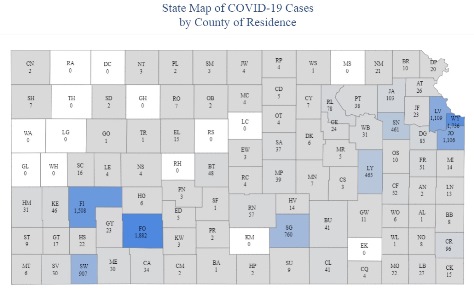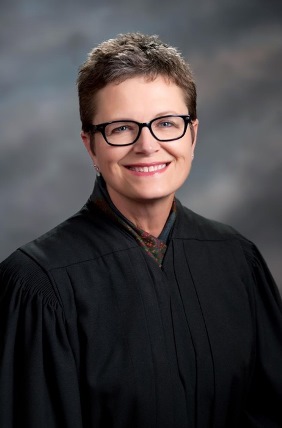
Gov. Laura Kelly on Monday encouraged the state’s residents to continue to follow health guidelines to reduce the spread of COVID-19.
Gov. Kelly thanked the residents of the state for following health guidelines during the past few months. While Kansas in general is seeing a downward trend in hospitalizations and deaths, that is not the case in 21 other states, which are experiencing increases, she said.
Most Kansans have been following the guidelines, as shown by the good trend lines in the state, she said.
“Please be mindful, this is not over,” Gov. Kelly said. She urged residents to continue to follow the advice of health experts, to wear masks, to wash hands frequently and to avoid gatherings where social distancing is not possible.
“We are not out of the woods yet,” she said. “Two hundred forty five Kansans have lost their lives to this virus. That’s far too many. A low case rate does not mean no cases.”
Until a vaccine is readily available and they have eliminated the threat of COVID-19, it’s not over, she said.
Kansas decided to let local communities decide whether to continue the Ad Astra reopening plan. Some communities, including Sedgwick County (the Wichita area), chose to stop enforcing the health guidelines on May 27, she said, and some are now experiencing increases.
“Last Friday, Sedgwick County reported 215 active cases, which is the highest number of cases the county has reported,” Gov. Kelly said. “This is not a coincidence.”
Mitigation has worked where communities have followed the guidelines, encouraged the use of masks, she said. If communities do not do this, more lives will be lost, it will halt the economy and prevent children from returning to school, she added. She said the state would continue to be guided by the data.
“You are your own preparedness,” Dr. Lee Norman, Kansas secretary of health, said. “Just because a county opens up doesn’t mean you have to change your own safety behaviors.”
Kansas saw an increase of 372 positive COVID-19 cases since Friday, according to state officials.
The state reported 11,419 positive cases on Monday, and 245 deaths, an increase of two deaths since Friday, according to Dr. Lee Norman, Kansas secretary of health.
Dr. Norman reported 165 clusters of cases in the state, 89 of which are active, which have accounted for 5,740 cases and 173 deaths.
Those clusters include four in corrections, with one not active, for 1,026 cases and seven deaths; three clusters in schools or daycares, with 10 cases; 17 clusters from gatherings, with 10 inactive, for 201 cases and 13 deaths; six clusters from group living with four inactive, resulting in 55 cases and three deaths; seven clusters in health care, with four inactive, and 57 cases; 39 clusters in long-term care, with 19 inactive, resulting in 803 cases and 131 deaths; 11 clusters in meatpacking, with one inactive, resulting in 2,939 cases and 13 deaths; and 78 clusters in private industry, with 36 inactive, resulting in 649 cases and six deaths.
Dr. Norman reported that a week ago Thursday, KDHE found out about a positive COVID-19 case at the Geary County Jail, where a member of law enforcement tested positive. The state went in and did testing of offenders and staff and found five positive cases, he said. They will go back Wednesday and test around the same number again. He said he expected to find that it has been contained, and is an example of swift work with a successful outcome.
He said the KDHE works with the local health departments, responding when they are requested to help.
On Monday the KDHE was responding to an industry where about 500 people were being tested, he said.
County totals from around the state
Wyandotte County reported 1,677 cases on the UG’s COVID-19 website on Monday.
Other county totals on Monday, according to the KDHE, included Johnson County, 1,106; Leavenworth County, 1,109; Ford County, 1,882; Finney County, 1,508; Seward County, 907; Sedgwick County, 760; Lyon County, 465; and Shawnee County, 461.
The state’s COVID-19 test page is at https://www.coronavirus.kdheks.gov/280/COVID-19-Testing
The UG’s COVID-19 information page is at https://alpha.wycokck.org/Coronavirus-COVID-19-Information.
Wyandotte County is currently under Phase 3. See covid.ks.gov.
The state plan’s frequently asked questions page is at https://covid.ks.gov/wp-content/uploads/2020/05/Reopening-FAQ_5.19.2020_Final.pdf.
Test sites are listed on the Wyandotte County website at https://wyandotte-county-covid-19-hub-unifiedgov.hub.arcgis.com/pages/what-to-do-if-you-think-you-have-covid-19.
The CDC’s COVID-19 web page is at https://www.cdc.gov/coronavirus/2019-nCoV/index.html.

